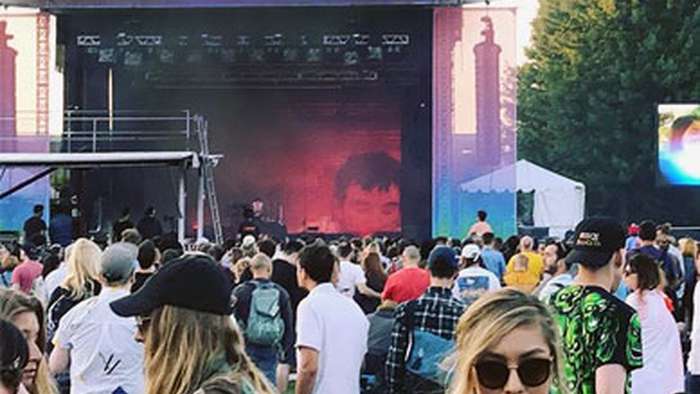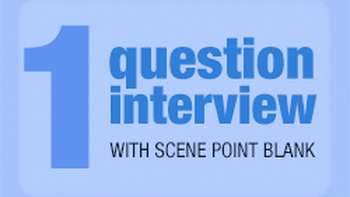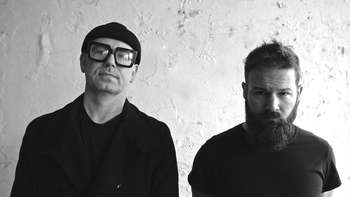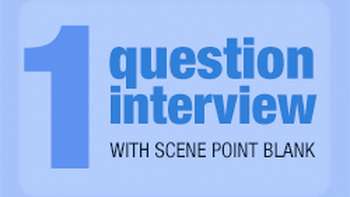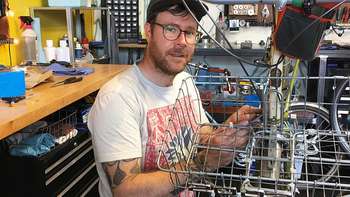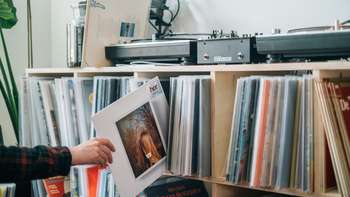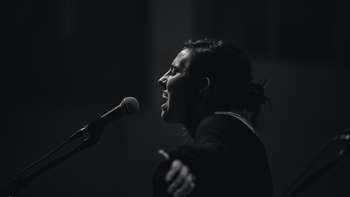Pitchfork Music Festival descended on Chicago’s Union Park for the thirteenth straight year (their "curation" of 2005’s Intonation Music Festival notwithstanding) for what’s turning into a third weekend in July tradition. What started as a summertime platform for a lot of buzzy under-the-radar acts has swelled into a verifiable hodgepodge of, well, that, plus artists just about to crest and straight-up legends. 2017 was no different, as this year’s headliners included the reformed LCD Soundsystem, A Tribe Called Quest and Solange, who is having a banner year on the heels of last year’s A Seat at the Table.
Friday
The fest kicked off shortly after lunch on Friday afternoon with a set by L.A.- based electronic Madame Ghandi. Ghandi’s set was shortly followed by D.C.-based punk group Priests, who returned to Chicago for the first time since February after the release of their debut, Nothing Feels Natural.

Priests
Priests have toured relentlessly behind the record, and it shows. After a lengthy European run, they sound like a well-oiled machine. Katie Alice Greer seems more assured than ever as a front person, slinking across stage and comfortably bantering with the crowd between songs. Meanwhile, guitarist G.L. Jaguar stands to her right shuffling off fiery solos. Bassist Taylor Mulitz and Daniele Daniele are in lockstep as rhythm section. Jetlag doesn’t seem to a be a thing for them right now, and it’s scary to think about what sounds they’re going to cook up next.
Hiss Golden Messenger was another highlight of Friday afternoon. The weather in Chicago was a breezy 70-something degrees but characteristically humid. Hiss frontman M.C. Taylor’s croon was perfect for this weather, and cuts from last year’s Heart Like a Levee felt like they had added weight. Taylor also divulged that the band would have an album out this fall and played several selections from the record including the as-yet-titled album’s final song that asks the question, “What you gonna do when the wall comes down?”
Also in, the early evening, a new-look Danny Brown took the stage – he’s cut his hair and has replaced his missing teeth. He started his set with early favorite “Die Like a Rockstar” before launching into a career-spanning set.

Dirty Projectors
The most curious set of the night was that by Dirty Projectors, with a lineup of Dave Longstreth and a backing band (featuring former Battles frontman Tyondai Braxton). The latest Dirty Projectors album sounds great recorded, but something about the set felt like disorganized chaos. Guitars and vocals never seemed to hit right, and the horn section never managed to pick up the slack. It just seemed disorienting more than inventive, and it felt like a real missed opportunity to create something wild out of insular compositions.
LCD Soundsystem closed night one with what else? The hits, of course. The band has a new album out September 1, titled American Dream. They started their set off with “Yr City’s A Sucker” – not sure if that was directed at Chicago or not – but it was effective nonetheless. LCD is an effortlessly fun band to see live, and while they stuck with mostly songs fans new, the new songs “Call The Police” and “American Dream” made an appearance midway through the set. Of course, the night ended with the classic “All My Friends,” which, at this point, is an era-defining classic.
Saturday
Jeff Rosenstock kicked off Saturday with a furious collection of songs heavy on last year’s Worry and selections from 2015’s We Cool? Rosenstock’s place atop the DIY scene made his place at Pitchfork a little curious, and he let the crowd know during one of the band’s interludes, that Pitchfork paid him and the band $7,500 to play the festival. They got every dollar. Playing for roughly 40 minutes, Rosenstock and band burst through one song into another into another, before crescendoing into an absolutely mind-blowing “You, In Weird Cities” – when Rosenstock grabbed a saxophone and ran between the barricades to solo on it. Wild.

George Clinton and Parliament Funkadelic
George Clinton and Parliament Funkadelic showed up in the late afternoon and were simultaneously one of the most exciting and confusing parts of the afternoon. “Alice in My Fantasies” sounded positively rap-metal, including an interpolation of “Get Low”. It was often hard to discern where one song began and another ended, and Clinton often lent himself to be more of a ringleader for the cast of musicians playing with P-Funk. Even with limited knowledge of Clinton’s catalog, it was a really good time. That seemed to be the point.
Mitski’s set on the blue stage was one of the most buzzed-about going into the festival. Puberty 2 is full of amazing songs left and right, and Mitski’s voice and thunderous bass playing were great to watch. Midway she played what is starting to be her signature song, “Your Best American Girl” before rounding out the set with “My Body’s Made of Crushed Little Stars,” which just might be the best song in her catalog. Regardless, hard to believe she was on a side stage, when she could have commanded twice as many fans with this set.

Francis and the Lights
Following Mitski on the blue stage was Francis and the Lights, who has made a name for himself with his collaborations with Bon Iver’s Justin Vernon and more recently, Chance the Rapper. Francis’s set was unique as it was simply the artist dressed in a shoulder-padded jacket, a synthesizer and nothing else. He relied on pre-programmed tracks and his dance moves, which shouldn’t be captivating but were hard to take your eyes off of. He sounds like Phil Collins, sure, but definitely doesn’t move like him.
A Tribe Called Quest closed Saturday evening, and they sure-as-shit didn’t disappoint. Pitchfork marked the first full set since Phife Dawg’s death, and the group showcased their fallen member in the most tasteful of ways, giving space to his verses that didn’t feel tacky. The group, especially Q-Tip, felt fired up and alive. Also, it’s amazing how well tracks from last year’s We Got It from Here... Thank You 4 Your Service fit so seamlessly in their catalog. The set was important, but not weighty, and that’s the magic of a group like Tribe.
Sunday
Sunday seemed like the lowest-stakes day by a long shot, with many of the artists high on talent and lower on name-value. It didn’t seem to matter. The Avalanches cancelled due to a family illness, setting up Chicago native Jamila Woods for a prime spot on the Green Stage. Nicolas Jaar would use cameras and video effects to enhance his electronic music on the red stage and Solange would bring trademark theatrics to define the weekend.
Kilo Kish’s early afternoon set was high on performance art, where at times she broke into maniacal laughter and smashed a briefcase. It all seemed in line from last year’s Reflections in Real Time and was like a rare time an artist used the stage as a platform for their art and expression instead of just a place to play songs.
Pinegrove are a band that’s about to explode. They’ve developed a devoted fanbase over the years that’s only seemed to blossom with the release of 2016’s Cardinal, so their presence at the blue stage felt like something special. Frontman/guitar player Evan Stephens Hall had the crowd in the palm of his hand during singalongs like “Size of the Moon,” “Old Friends,” and of course, the gorgeous “Aphasia”. Pinegrove are not long for smaller rooms. This band is about to get much bigger, and this was just a preview of what they’re capable of next.

American Football
American Football closed the blue stage and acted an alternative festival closer for those who would not be attending Solange’s performance on Sunday evening. Their set opened with the classic “Stay Home” from 1999’s self-titled album before weaving in songs from last year’s album, also titled American Football. Whether that song was a message to the crowd, it didn’t seem to matter. Their textured guitars and horns were a great choice to position Sunday evening.
Notes and More
New this year: “Pitchfork Plus +” - the festival's first ever ticket upgrade option, featuring food and beverage vendors such as Parson’s Chicken and Fish, Lost Lake tiki bar, the soon-to-debut Lonesome Rose and more. For this added amount, ticket buyers had access to a live video feed, complimentary headphones, private bars and bathrooms and commemorative merchandise. That said, the vendors for the general population of festival goers were no slouch, either - featured food and beverage vendors from local establishments such as Leghorn Chicken, The Goddess and Grocer and The Chicago Diner.

As always, Pitchfork Music Festival has a variety of activities and booths to keep festival goers entertained. The Chirp Record Fair is always a high-point with independent labels and vendors from all over with rare, exclusive or just plain weird records to pick up. Also present was the Renegade Craft Fair, “the world’s largest curated showcase of independent craft and design, creates a vibrant and lively marketplace that reflects and illuminates the work of today’s modern makers.” For readers, there was Book Fort, a place to pick up new books and learn about independent publishers, attend readings, special performances and encouraging networking opportunities. Flatstock is a gathering of show-poster artists hosted by the American Poster Institute and Speedball that has some of the best screenprints you’ll find. It’s hard to leave without picking up a poster, a print or some other sort of item by supremely talented artists.

Overall, Pitchfork Music Festival was a memorable addition to the fest’s long history. The lineup of artists seems to diversify each year, and in turn brings different fans from all walks. If there is a major criticism, it feels like the festival is starting to outgrow Union Park. While it’s unlikely Pitchfork leaves such a quality space, more effort will be need to expand the grounds for the larger crowds. Either way, it’s one of Chicago’s best festivals and worthy of a return in coming years, regardless of the lineup.
